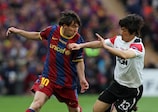50th edition of The Technician
sexta-feira, 11 de novembro de 2011
Sumário do artigo
The Technician has covered a vast array of coaching topics since it first rolled off the presses in March 1997 and its 50th edition looks at a highly successful 14 years for the European game.
Conteúdo media do artigo

Corpo do artigo
UEFA's official coaches' publication The Technician reaches a milestone with its latest edition – No50 in a series of fascinating issues since the magazine kicked off in March 1997.
At that time, AFC Ajax, Borussia Dortmund, Juventus and Manchester United FC were contesting the UEFA Champions League quarter-finals. The Technician's aim was to inform practising coaches about UEFA events, highlight coaching matters, recognise winning coaches and carry interviews with leading technicians.
In his editorial, UEFA technical director Andy Roxburgh looks at what he describes as a highly successful 14 years for European football since The Technician first rolled off the presses. The great coaches have been saluted for their triumphs in club and national team football at continental and world level, and fitting tributes have been paid to trainers who have passed away.
UEFA's technical programme has been covered across the board, from the Elite Club Coaches Forum which brings together leading club coaches each September, and the Conference for European National Coaches held after every FIFA World Cup and UEFA European Championship, to grassroots conferences, coach education events and seminars organised under the umbrella of the innovative UEFA Study Group Scheme.
"The use of interviews, editorials and event reports have provided a vehicle for sharing the wisdom of elite coaches and bringing important issues into the public domain," Roxburgh writes.
Chelsea FC's young manager André Villas-Boas takes pride of place in edition No50 as he gives reasons for his rise to prominence – "the more access you have to top players, the more likely you are to be successful as a coach," he reflects, adding that while a two-way relationship with players is essential to establish a healthy dialogue – "because of my age and my lack of a professional playing background, I could never be dictatorial" – he takes the final decisions. "If I have to upset a couple of people, then so be it.
September's UEFA Elite Club Coaches Forum in Nyon threw up its usual share of talking points and proposals, and The Technician analyses the two days of debate at an event which has become a key fixture on the UEFA calendar – with the European body welcoming the chance to hear the thoughts of men on football's front line.
The Technician, Roxburgh also explains, has highlighted the central role played by technical directors, who are charged with the technical aspects of a club or national association – coaching, women's football, grassroots, and coach educators. Good coach educators produce well-trained coaches who, in turn, can work to breed good footballers and fine teams. "Their work is rarely publicised, but their impact on the future of the game is immense," says Roxburgh.
It is fitting, then, that The Technician's latest issue contains an in-depth review of the ninth UEFA Workshop for Coach Education in Prague. Advances in coach education have been manifold over the years, and various national associations took the opportunity to put their views and activities into the spotlight. The workshop underlined the need for properly trained coach educators to help bolster UEFA's continuous striving to improve the game across Europe.
UEFA's youth development competitions offer a fascinating shop window on the men and women stars of tomorrow, and Spain's fostering of talented young players – many of whom have gone on to enjoy World Cup and EURO glory – is seen as a benchmark for others to emulate. Ginés Meléndez, the sports director responsible for coordinating all of Spain's age-limit teams, draws from his experiences as a UEFA technical observer to give a frank portrait of the modern-day elite youth game.
"The Technician has covered 14 years of glorious European football as seen through the eyes of the technician and has reported on all aspects of UEFA's technical development programme," says Roxburgh. "Decision-makers, administrators, referees, doctors, commentators and fans, as well as coaches, have all contributed to the game's progress during this time, but ultimately it is the players who have provided the spectacle and we take this opportunity to thank them ... Even after 50 editions, the truth remains: when players shine, coaches glow."





